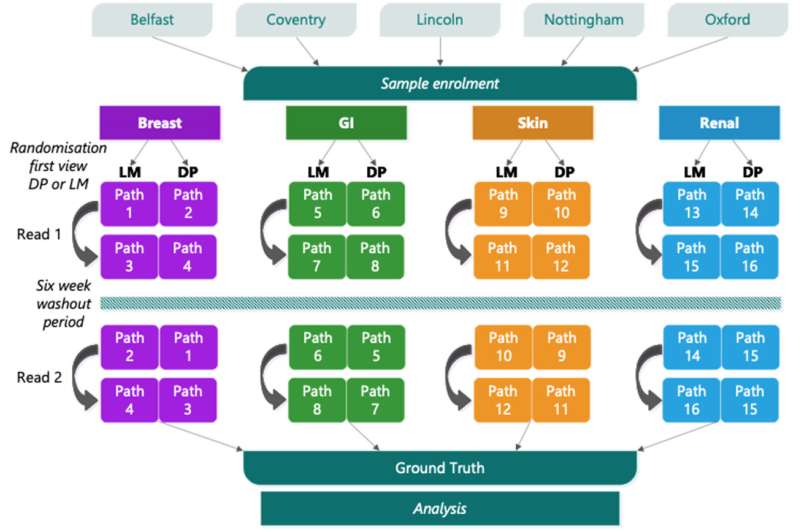This article has been reviewed according to Science X's editorial process and policies. Editors have highlighted the following attributes while ensuring the content's credibility:
fact-checked
trusted source
proofread
Digital pathology cleared for use in UK cancer screening programs

New research has led the UK government to approve the use of digital pathology to help speed up analysis of cancer screening samples. This allows the benefits offered by digital pathology to be used to improve cancer screening particularly in bowel, breast, lung and cervical cancers.
The use of this technology, based on research carried out by University Hospitals Coventry and Warwickshire (UHCW) NHS Trust and The University of Warwick's Clinical Trials Unit, will result in faster reporting of people's samples, helping to deliver world class care. The work is published in the journal Histopathology.
Histopathology—the examining of cells and tissues under a microscope—is a key step in many major disease pathways, where early detection of cancer plays a crucial role in survival.
Digital pathology is the use of automated slide scanners to digitize the histopathology process. Results are reported on computer workstations as opposed to a conventional microscope, enabling pathologists to report samples remote from the laboratory producing slides.
This process makes sharing samples easier, helping to reduce risk of loss or damage of samples. It also mitigates the need for pathologists to be present in hospitals, as they can review the slides remotely. Digitizing the slides might also allow the use of computer algorithms to help improve pathologists' performance in the coming years.
Following a consultation by the UK National Screening Committee, the Government has now approved the use of digital pathology for analyzing cancer screening samples.
Lead Researcher Consultant Pathologist Professor David Snead, of UHCW and The University of Warwick, said, "I am delighted that digital pathology is cleared for use in cancer screening programs. It is a big milestone to achieve and we are extremely proud that the work we have led proved so effective in making this change.
"The team would like to thank the pathologists, research fellows, statisticians and laboratory technicians who conducted the study and the technical support received from 3DHISTECH and Philips in providing equipment to make it happen. It was a huge task to do, but the data we produced was vital to demonstrate this technology is safe in the hands of our pathologists.
"UHCW can rightly claim to have led the world in the transition to using digital pathology in clinical practice. Doing so enables many benefits to be realized, including the option to use artificial intelligence-based tools to support pathologists in their work."
Professor Janet Dunn, lead for the Warwick Clinical Trials Unit, said, "It is great that the UK Government recognize[s] the importance of this research and has approved the use of digital pathology for screening. It was a pleasure to work with Professor David Snead on this important study."
More information: Ayesha S Azam et al, Digital pathology for reporting histopathology samples, including cancer screening samples—definitive evidence from a multisite study, Histopathology (2024). DOI: 10.1111/his.15129



















